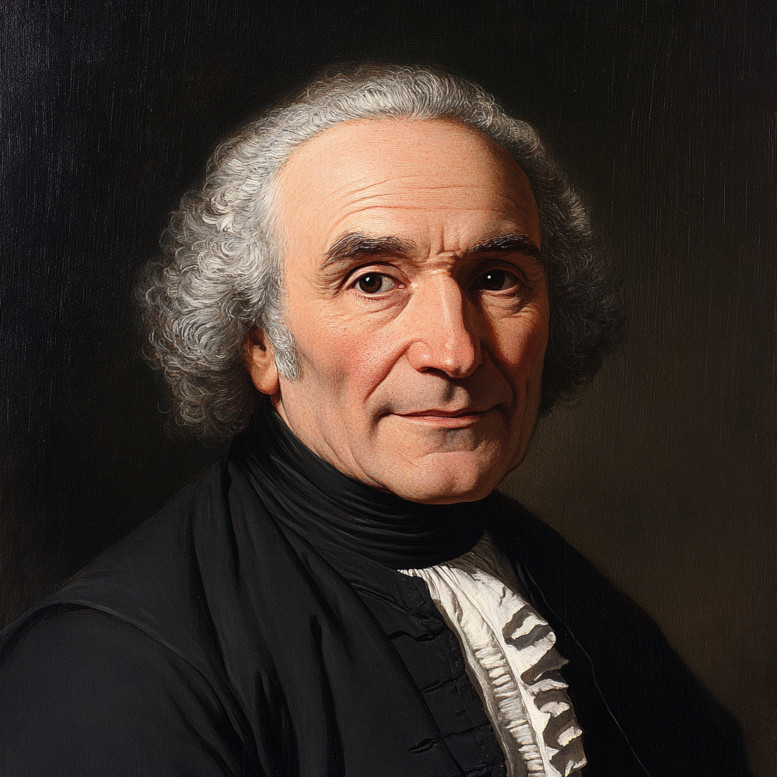


Joseph de Maistre (1753–1821) was a French-speaking Savoyard philosopher, writer, lawyer, and diplomat, known for his staunch defense of monarchy, the Catholic Church, and traditional social order in the aftermath of the French Revolution. He is considered one of the leading figures of counter-Enlightenment thought, which reacted against the secular, rationalist, and progressive ideals of the Enlightenment. De Maistre's works emphasize the importance of authority, the divine origins of political power, and the necessity of suffering and violence in human society. His ideas have had a lasting influence on conservative and reactionary thought in Europe.
Early Life and Background
Birth and Family Background: Joseph-Marie, comte de Maistre, was born on April 1, 1753, in Chambéry, the capital of the Duchy of Savoy, which at the time was part of the Kingdom of Sardinia. He was born into a noble family of French origin that had been long established in Savoy. His father, François-Xavier de Maistre, was a prominent lawyer and senator in the Savoyard government.
Education and Early Career: De Maistre received a classical education, studying at a Jesuit college in Chambéry. He later pursued legal studies and became a lawyer, eventually rising to the position of a magistrate in the Savoyard Senate. De Maistre's early experiences in the legal and political spheres, as well as his deep Catholic faith, shaped his conservative worldview.
Reaction to the French Revolution
Counter-Revolutionary Thought: The outbreak of the French Revolution in 1789 had a profound impact on de Maistre. He viewed the revolution, with its emphasis on equality, secularism, and popular sovereignty, as a catastrophic upheaval that threatened the very foundations of society. De Maistre believed that the revolution was a direct consequence of the Enlightenment's rejection of tradition, religion, and legitimate authority. He became a passionate critic of the revolution and a defender of monarchy and the Church.
Exile and Diplomatic Career: When the French revolutionary forces occupied Savoy in 1792, de Maistre fled to Switzerland, where he spent several years in exile. During this period, he wrote some of his most important works, articulating his opposition to the revolutionary ideas spreading across Europe. In 1803, he entered the service of the King of Sardinia and was appointed as an ambassador to the Russian Empire, a position he held until 1817. His time in Russia further reinforced his views on the importance of autocratic rule and the dangers of liberalism.
Major Works and Ideas
"Considerations on France" (1797): One of de Maistre's most significant works, Considerations on France (Considérations sur la France), was published in 1797 during his exile. In this book, de Maistre argues that the French Revolution was not merely a political or social event but a divine punishment for the sins of the French people. He believed that the revolution was a necessary, albeit tragic, event that would eventually lead to the restoration of the monarchy and the re-establishment of order. De Maistre's theory of "providential history" posits that historical events are guided by divine will, and that human beings must submit to the authority of God and the institutions that embody His will, such as the monarchy and the Church.
"Essay on the Generative Principle of Political Constitutions" (1810): In this essay, de Maistre contends that political constitutions are not products of human reason or deliberate design but are instead the result of historical development and divine providence. He criticizes the Enlightenment idea that societies can create constitutions based on abstract principles of reason and argues that true political order must be rooted in tradition, religion, and the authority of the monarch. De Maistre's emphasis on the organic development of political institutions was a direct challenge to the rationalist and revolutionary ideals of his time.
"The Pope" (1819): In Du Pape (The Pope), de Maistre presents a robust defense of the papacy and the Catholic Church as the ultimate sources of spiritual and temporal authority. He argues that the pope, as the representative of Christ on Earth, holds supreme authority over all human affairs, including political matters. De Maistre believed that the Church was the only institution capable of providing moral guidance and maintaining social order in a world threatened by secularism and revolution. His views on the papacy reflected his broader belief in the necessity of strong, centralized authority to prevent chaos and preserve civilization.
"St. Petersburg Dialogues" (1821): Les Soirées de Saint-Pétersbourg (St. Petersburg Dialogues), published posthumously in 1821, is one of de Maistre's most famous and philosophically complex works. The book is structured as a series of fictional dialogues between three characters who discuss various topics, including the nature of evil, the role of violence in history, and the necessity of sacrifice. In these dialogues, de Maistre elaborates on his belief that suffering and violence are intrinsic aspects of human existence and that they play a crucial role in the unfolding of divine providence. He also reaffirms his commitment to the principles of monarchy, religion, and traditional authority.
Influence and Legacy
Counter-Enlightenment and Reactionary Thought: Joseph de Maistre is considered one of the leading figures of the counter-Enlightenment, a movement that opposed the secular, rationalist, and individualist values of the Enlightenment. His works have been influential in the development of conservative and reactionary thought in Europe, particularly among those who sought to resist the spread of liberalism, secularism, and democracy in the 19th and 20th centuries.
Impact on Political Thought: De Maistre's ideas had a significant impact on later conservative thinkers, including the French traditionalist philosopher Charles Maurras and the Italian political theorist Carl Schmitt. His emphasis on the importance of authority, tradition, and religion in maintaining social order resonated with those who opposed the liberal and revolutionary currents of modernity.
Controversial Views: While de Maistre is admired by some for his defense of tradition and authority, his ideas have also been criticized for their authoritarianism, fatalism, and acceptance of violence as a necessary aspect of political life. His belief in the divine right of kings, the legitimacy of the Inquisition, and the necessity of suffering have made him a controversial figure in the history of political thought.
Legacy in Conservative Thought: Despite the controversies surrounding his ideas, de Maistre's influence on conservative thought cannot be overstated. He is often cited as a key figure in the intellectual tradition that emphasizes the importance of hierarchy, order, and the role of religion in public life. His critique of modernity and his defense of traditional values continue to resonate with some conservative thinkers today.
Joseph de Maistre was a profound and influential thinker whose works provided a counterpoint to the revolutionary and Enlightenment ideas of his time. His defense of monarchy, religion, and traditional social order made him one of the leading figures of the counter-Enlightenment and a significant influence on conservative and reactionary thought. While his ideas have been the subject of debate and controversy, de Maistre's legacy as a champion of authority, tradition, and the divine origins of political power remains an important part of the history of political philosophy.

We use cookies
We use cookies and other tracking technologies to improve your browsing experience on our website, to show you personalized content and targeted ads, to analyze our website traffic, and to understand where our visitors are coming from. Privacy Policy.